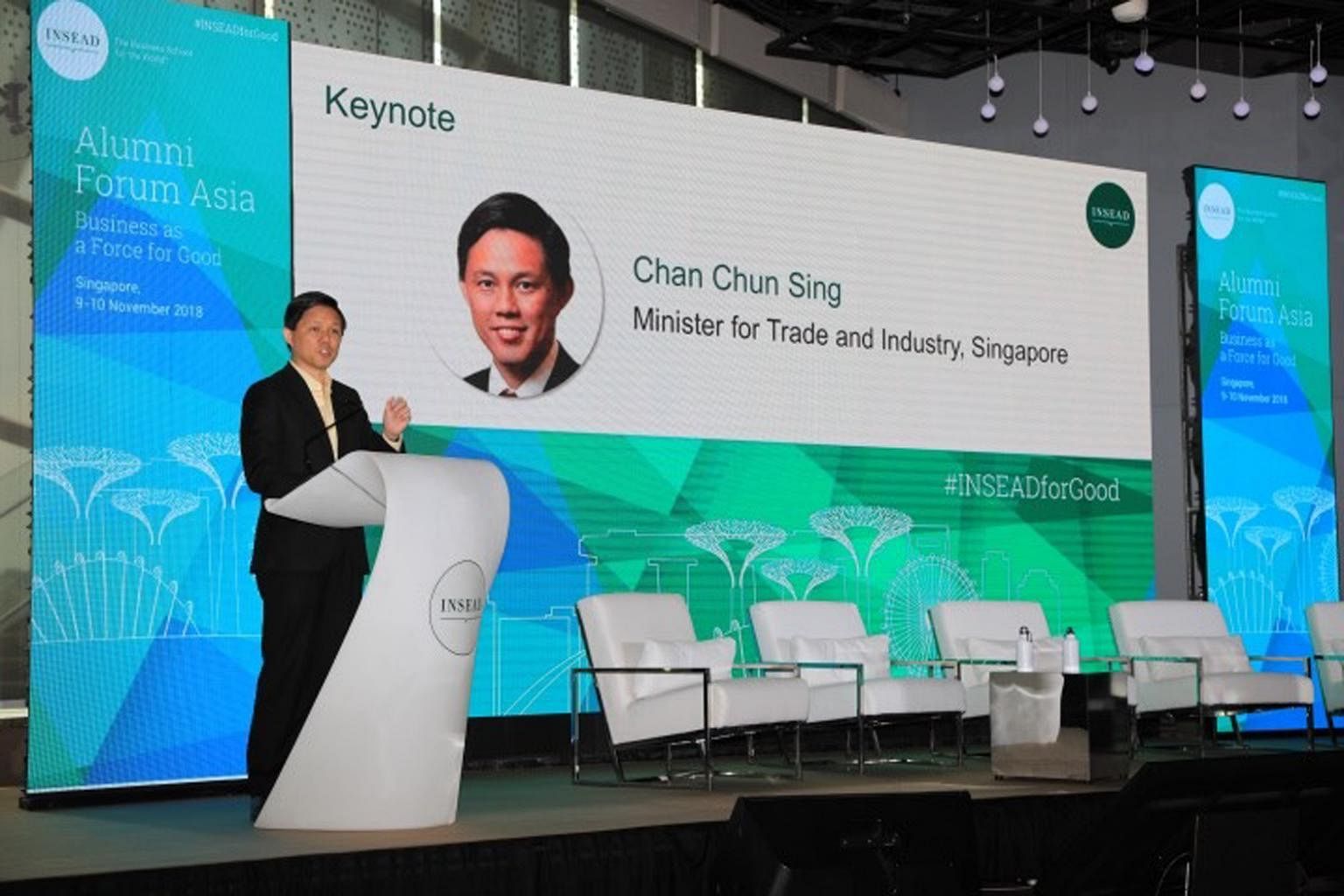Governments and businesses must build a sense of stewardship in people: Chan Chun Sing
Sign up now: Get ST's newsletters delivered to your inbox

Minister for Trade and Industry Chan Chun Sing's speech delved into the topic of corporate social responsibility and the challenges involved.
PHOTO: INSEAD
Ng Jun Sen
Follow topic:
SINGAPORE - To be a force for good, businesses and governments must work together to imbue a sense of stewardship in people, said Minister for Trade and Industry Chan Chun Sing on Saturday (Nov 10).
But he acknowledged that this was not going to be easy.
He said: "How do we bring about this concept of stewardship and imbue that into the next generation where the definition of our success is not how well we do for ourselves here and now, but the definition of our success is how well we enable our next generation to do even better than us?."
"That is our challenge, and that is a tall order."
Governments and companies must first build a meritocratic system of talent and trades for this to happen, said Mr Chan in a keynote speech at the Insead Alumni Forum Asia. The topic of the forum was "Business as a force of good."
"How do we build a system that allows the human potential to flourish? How do we build a meritocratic system of talent and trades where each and every individual's achievement is determined by his talent, effort and commitment, and never by his language, race, religion, ancestry or family ties," said Mr Chan.
This is fundamental, as businesses and governments will never be able to convince people that they are here to do good if people cannot hope to fulfil their potential without facing barriers along the way, he said.
"We need to speak to the individual aspirations of our people, no matter how diverse those aspirations might be," he added.
Addressing 700 international business leaders, many of whom graduated from Insead, Mr Chan's 28-minute speech at the Gardens by the Bay delved into the topic of corporate social responsibility (CSR) and the challenges involved.
It is not easy to be a force for good, either for businesses or for governments, due to the trappings of the prisoner's dilemma, he said. The dilemma describes why two parties do not collaborate for the greater good, due to other competing interests.
In some cases, a business that is concerned about their quarterly reports might only commit to CSR if their competitors do so too, while governments may only engage in climate change action, for instance, if other nations follow suit. "For governments, the routine democratic processes in trying to survive the next election for most governments matters as well," Mr Chan said.
He said one school of thought regarded CSR as an oxymoron, as businesses should focus on growing wealth for their shareholders, who will decide to do good on their own accord.
A growing group of business leaders today, however, believed in another theory - one where companies are stakeholders in society and has a responsibility towards that society, he said. Such a mindset would also help attract the best and brightest talents to join companies that have strong social missions.
"The verdict still seems to be still open into which school of thought shall prevail in the longer term," said Mr Chan.
With geopolitics fuelling protectionist trade policies and the rising levels of disruption caused by technological change, he said there are growing concerns around the world about the quality and quantity of jobs.
The reality of a more integrated world economy today will result in winners and losers, he said. This means countries will need to adjust domestically.
The way which the society manages this disparity will have political implications, he said, alluding to how some countries in recent years did not properly manage their social divisions as the world became more globalised, resulting in backlash.
In a panel discussion following Mr Chan's speech, industry experts discussed the same issue on the challenges of CSR, adding to those raised by the minister.
Partner of Bridges Fund Management Clara Barby said a major issue is defining how wealth and values are measured, since different cultures vary in their definition.
DBS Bank chief executive officer Piyush Gupta said that palm oil producing countries, for example, have grappled with this issue as the world moves away from using palm oil for energy due to environmental concerns.
"If you (ask them to) turn off the palm oil tomorrow, what are you going to do with the millions of people, whose governments won't be able to look after them if palm oil is their only means of livelihood," said Mr Gupta.
"Is this a sense of colonial imperialism? Who are we to play god? There are no easy answers."

